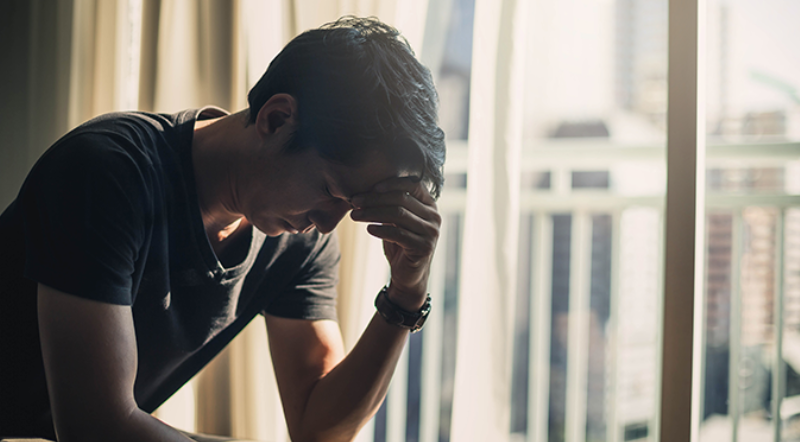Anxiety and addiction frequently converge, complicating the recovery process and amplifying symptoms. This intersection establishes a cycle in which each condition worsens the other, thereby hindering the attainment of sustainable recovery.
Our expertise lies in comprehending the interplay between anxiety and addiction, their effects on everyday life, and the necessity of addressing both issues to secure enduring mental health.
When left untreated, anxiety disorders can lead to other mental health challenges, including substance abuse.

Surf City Detox offers dual diagnosis treatment to help people effectively manage their anxiety and addiction in Huntington Beach, California. As a trusted detox center in Huntington Beach, CA, we provide compassionate, evidence-based care tailored to the unique needs of those facing co-occurring disorders. Our programs are designed to break the cycle between anxiety and addiction, offering a safe and supportive environment for healing.
Anxiety disorders are among the most common mental health conditions in the United States, affecting millions of people each year. They can range from generalized anxiety to more specific forms, such as social anxiety or phobias.
The Physical and Emotional Toll of Anxiety
Anxiety does not just affect the mind—it impacts the body as well. Chronic anxiety can lead to physical health problems such as high blood pressure, digestive issues, and weakened immunity. Emotionally, anxiety often leads to feelings of isolation and helplessness, creating a cycle that becomes increasingly difficult to break. Understanding the far-reaching effects of anxiety is essential to seeking proper treatment.
What Is an Anxiety Disorder?
The exact causes of anxiety disorders are not fully understood, but they are believed to result from a combination of genetic, environmental, and psychological factors. Traumatic life events, family history of anxiety, and brain chemistry imbalances are common contributors.
Risk Factors for Anxiety Disorders
Some factors that increase the likelihood of developing an anxiety disorder include:
- Family History: A genetic predisposition to anxiety disorders.
- Childhood Trauma: Experiencing abuse, neglect, or other traumatic events.
- Personality Traits: Certain personality types, such as perfectionism or introversion, may be more prone to anxiety.
- Chronic Stress: Long-term exposure to stressful environments or situations.
Understanding these risk factors can help individuals and healthcare providers identify and address anxiety disorders early.
Signs and Symptoms of Anxiety
- Emotional Symptoms: Persistent worry, fear, or dread; irritability; feelings of restlessness.
- Physical Symptoms: Rapid heartbeat, sweating, trembling, shortness of breath, dizziness, fatigue, or muscle tension.
- Behavioral Symptoms: Avoidance of specific situations or places, difficulty concentrating, or changes in sleep patterns.
It is essential to recognize these signs early and seek professional help, especially if anxiety symptoms are interfering with daily functioning.
Long-Term Effects of Untreated Anxiety
If left untreated, anxiety disorders can lead to significant complications, such as:
- Development of other mental health disorders, including depression.
- Increased risk of substance abuse as a coping mechanism.
- Strained relationships and social isolation.
- Physical health issues, including heart disease and gastrointestinal problems.
Seeking early intervention is crucial to prevent these long-term effects.
Types of Anxiety Disorders
- Generalized Anxiety Disorder (GAD): Characterized by excessive worry about everyday events or activities.
- Social Anxiety Disorder: Involves intense fear of social situations or being judged by others.
- Panic Disorder: Marked by recurring panic attacks, which are sudden episodes of intense fear accompanied by physical symptoms.
- Phobias: An irrational fear of specific objects, situations, or activities, such as heights or flying.
- Obsessive-Compulsive Disorder (OCD): Involves unwanted, recurring thoughts and repetitive behaviors.
- Post-Traumatic Stress Disorder (PTSD): Develops after experiencing or witnessing a traumatic event.
Each type of anxiety disorder requires a unique approach to treatment, which may involve behavioral therapy, medication, or a combination of both.
Overlapping Symptoms Between Types of Anxiety
It is not uncommon for individuals to experience symptoms of more than one type of anxiety disorder. For instance, someone with GAD may also experience social anxiety, making a comprehensive evaluation by a mental health professional critical for effective treatment.

Anxiety and Addiction Statistics
- Approximately 40 million adults in the U.S. (19.1% of the population) experience an anxiety disorder each year.
- Nearly 20% of individuals with an anxiety disorder also have a substance use disorder (SUD).
- People with anxiety are twice as likely to develop substance abuse issues compared to the general population.
- Among individuals with co-occurring disorders, only about 9% receive treatment for both conditions.
These statistics emphasize the importance of addressing anxiety and addiction simultaneously through comprehensive treatment programs.
The Relationship Between Anxiety Disorders and Substance Abuse
The Connection Between Anxiety and Addiction
Anxiety and addiction often have a bidirectional relationship, meaning one condition can contribute to the development of the other. Individuals with anxiety may turn to drugs or alcohol as a way to self-medicate and alleviate their symptoms. However, substance use can exacerbate anxiety, creating a harmful cycle that is difficult to break.
Dual Diagnosis
When anxiety and addiction occur together, it is known as a dual diagnosis or co-occurring disorder. Treating dual diagnosis requires an integrated approach that addresses both conditions simultaneously. Neglecting one condition can hinder recovery and increase the risk of relapse.
Understand how anxiety and addiction can intersect and co-occur in SAMHSA’s Mental Health and Substance Use Co-Occurring Disorders resource.
How Does Anxiety Affect Substance Abuse?
Anxiety can lead to substance abuse in several ways:
- Self-Medication: People with anxiety may use alcohol or drugs to numb their feelings of fear or worry.
- Increased Vulnerability: Chronic stress and anxiety can weaken coping mechanisms, making individuals more susceptible to addiction.
- Biological Factors: Shared brain pathways and chemical imbalances can contribute to both anxiety and substance abuse.
While substances may provide temporary relief, they ultimately worsen anxiety symptoms, creating a vicious cycle.
Breaking the Cycle of Anxiety and Addiction
Breaking the cycle of co-occurring anxiety and addiction requires professional intervention. Evidence-based therapies, support groups, and medication can all play a role in helping individuals regain control of their lives.
Diagnosing Anxiety and Addiction
- Comprehensive Assessment: A detailed review of medical history, substance use patterns, and mental health symptoms.
- Diagnostic Criteria: Using tools like the DSM-5 to identify anxiety disorders and substance use disorders.
- Physical Examination: To rule out underlying medical conditions that may contribute to symptoms.
Accurate diagnosis is essential for developing an effective treatment plan tailored to the individual’s needs.
Challenges in Diagnosing Co-Occurring Disorders
Diagnosing dual diagnosis can be challenging due to overlapping symptoms. For example, substance use can mimic or mask anxiety symptoms, making it difficult to identify the root cause. A multidisciplinary approach is often necessary to achieve an accurate diagnosis.
Dual Diagnosis Treatment: For Anxiety and Addiction
- Behavioral Therapies: Cognitive-behavioral therapy (CBT) and dialectical behavior therapy (DBT) are commonly used to address anxiety and substance abuse. Therapy can also be administered in an individual setting or a group setting.
- Medication Management: Anti-anxiety medications, antidepressants, or other medications may be prescribed to manage symptoms.
- Support Groups: Participation in groups like Alcoholics Anonymous (AA) or Narcotics Anonymous (NA) can provide peer support and encouragement.
The Importance of Individualized Treatment Plans
Each person’s experience with anxiety and addiction is unique. Personalized treatment plans that consider an individual’s specific needs, preferences, and circumstances are essential for achieving lasting recovery.
Find Healing at Surf City Detox
Whether you are seeking inpatient detox, residential therapy, or ongoing support, our programs are tailored to meet your unique needs. Take the first step toward recovery and find hope and healing at Surf City Detox.

Why Choose Surf City Detox?
- Comprehensive Care: We offer integrated treatment for co-occurring disorders.
- Experienced Staff: Our team includes licensed therapists, medical professionals, and addiction specialists.
- Customized Programs: We create personalized treatment plans to meet your specific needs.
- Supportive Environment: Our facility provides a safe and welcoming space for recovery.
Contact us today to learn more about our treatment programs and start your healing journey.
Surf City Detox Accepts Insurance
We accept many insurance plans to help cover the cost of addiction treatment. Contact your provider to get more information or call our office to reach an intake specialist.


















